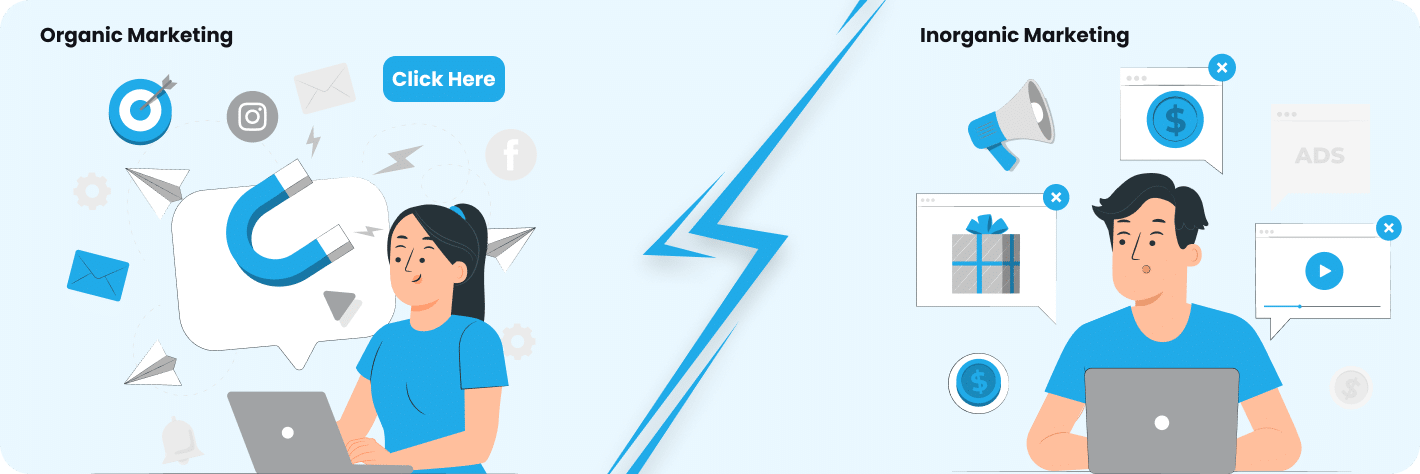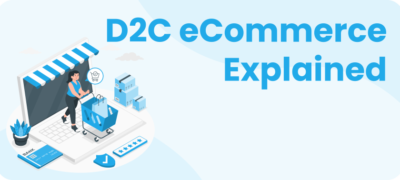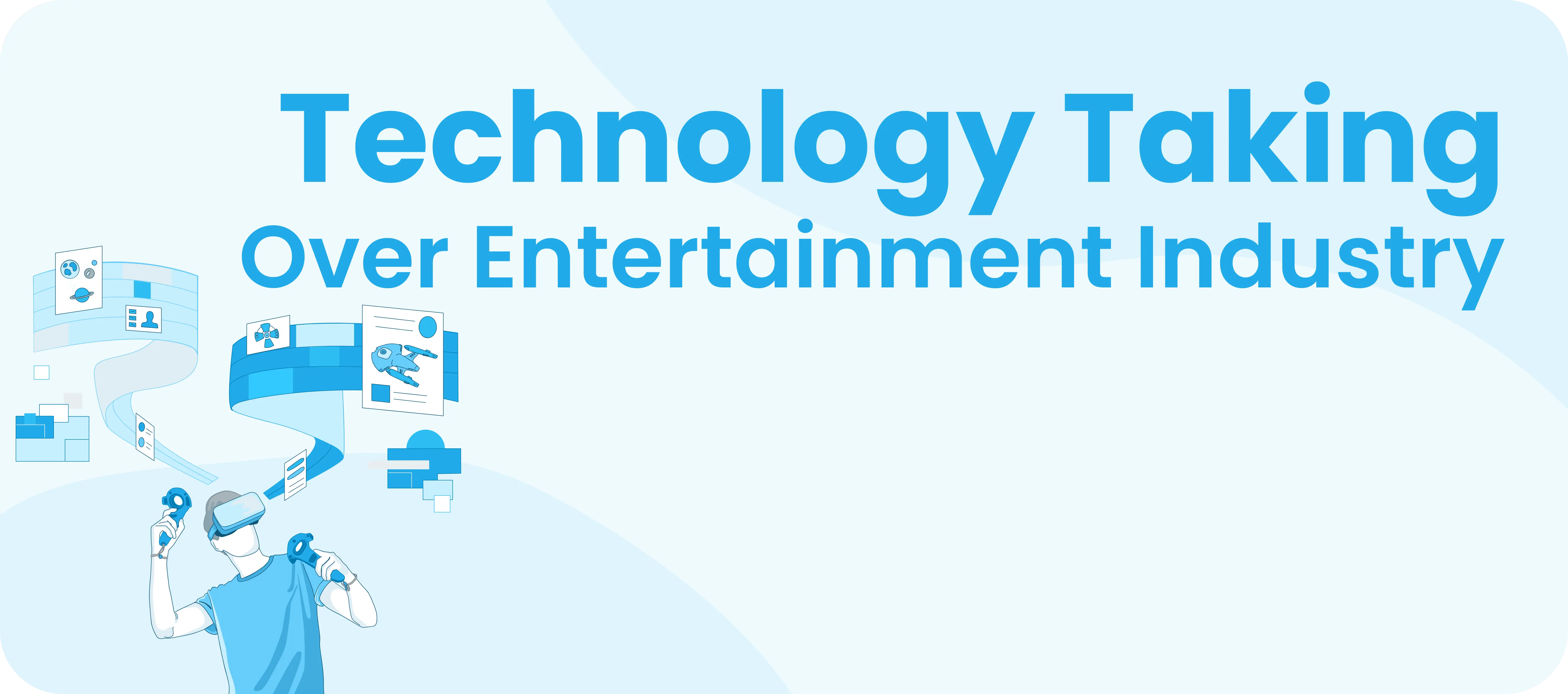Why Organic Marketing is Your SME’s Secret Weapon
Short Description
This is absolutely not for business owners who are not seeking a way to level up their organization’s game. Let us cut to the chase, paid ads are like a dopamine kick, they’ll surely help you with the visibility but only until you have that big fat dollar in your pocket. Let’s be honest for a moment, SMEs initially face costing issues because you guys are more focused on delivering quality rather than quantity, and to be honest we are proud of you. However, we are here to help you level up your business for good. Yes, we are talking about organic marketing, it builds lasting brand assets cost-effectively. This blog post explores why SEO, Social Media, Content Creation, and other Organic strategies should be the cornerstone of SME marketing. Learn how to leverage organic marketing’s targeted reach, brand-building benefits, and sustainable growth to drive results without big ad budgets. Key takeaways help SMEs focus their efforts for long-term success.
Introduction
Listen up, small business owners! When it comes to marketing your company, We know the siren song of paid advertisements can be tempting. Who wouldn’t want to see their brand flashing across social media or landing at the top of search results with just a few clicks and a credit card? But hold your horses – have you been giving organic marketing the TLC it deserves?
Let us drop some knowledge real quick. Studies show over 70%-80% of searchers click organic results over sponsored links. Boom! People are looking for authentic connections, not in-your-face ads. We mean it helps, but the real question is — does it help your business in the long run? Keep that in mind as we dive into the nitty gritty of why organic marketing should be your focus as a small or medium business.
First, let’s get clear on definitions. Organic marketing covers strategies like SEO, Social Media, Content Creation, Influencers, E-mail, and referral programs. The key thread is that it’s unpaid – earned through relevance and relationships rather than pure promotion. Paid marketing is just that – any ads or sponsorships that you shell out the budget for. Think PPC, social ads, banner ads, and the like.
The main difference? Organic is about playing the long game. It takes time and consistency to see results. But it builds assets that pay dividends for your brand over the years. Paid campaigns offer instant returns but quickly fizzle once the dollars stop flowing. Still not convinced organic should be your priority? Let me break it down further.
Why Organic Marketing Rocks for SMEs
More Cost Effective Over the Long Term
We all know small businesses have limited marketing budgets. Organic channels level the playing field. Channels like SEO and email marketing cost little to nothing to implement once you make the initial time investment. And they continue building your brand months and years down the line. Compare that to paid ads – stop spending and those hard-fought clicks also stop.
Builds Lasting Assets and Brand Awareness
With organic marketing, you cultivate living assets that grow over time. Your SEO rankings don’t disappear if you miss a month of link building. Your social media followers stay on board through the ups and downs. That brand awareness you built through content marketing compounds as more people see your name around. Paid media buys ratings and clicks – not relationships. As soon as you turn off the tap, those benefits trickle away.

Delivers Targeted Reach Where It Matters
While paid ads let you laser target keywords and demographics, organic channels often give you wider exposure among potential customers who are actually searching for you. And because they found you themselves vs just seeing an ad, that traffic converts better too!
Enhances Brand Image and Thought Leadership
Organic channels allow you to share valuable content and perspectives with no strings attached. This strengthens your reputation as a trusted resource and thought leader. Paid media is inherently promotional – not great for long-term credibility.
Levels the Playing Field Against Big Brands
As a small business, you’ll never be able to outspend the big brands paying for all those TV commercials and Times Square billboards. But you CAN compete on SEO, social media engagement, and reviews. Organic channels are a great equalizer if you play them right.
Okay, are you digging organic marketing a bit more now? Let’s talk nuts and bolts. Here are 5 tips to grow your organic presence:
1. Create Helpful, Engaging Content: Content is king for organic – it brings people in and keeps them coming back. Focus on topics and formats that deliver real value to your audience. That earns trust and loyalty over time.
2. Cultivate Your Social Community: Be consistent in posting content and engaging with followers across platforms. Social is a garden that needs daily tending to bear fruit long-term.
3. Build Your SEO Foundation: Claim and optimize online listings, build high-quality backlinks, and monitor site performance. SEO is an ongoing effort but pays dividends.
4. Monitor Reviews and Referrals: Encourage happy customers to leave reviews and refer friends. Word-of-mouth is marketing gold. Make it easy to rave about you!
5. Take the Slow Burn Approach: Have patience. Organic compounds gradually over months and years. Set goals by quarter, not month. The time you put in now propels growth later.
We know, going organic may not be as flashy and immediate as paid ads. But for small business marketing to be sustainable, you need a solid foundation built on trust. Organic marketing sows the seeds for that – nurture it daily and watch it blossom into a thriving garden that drives growth for years to come!
Ready to Elevate Your Brand in the Industry?
Contact WebOsmotic Digital Marketing Experts & Get Your Strategic Session Now!
Conclusion
The moral here? Develop organic strategies now and supplement with paid ads later as needed. Lean on slow-burn channels that convert visitors into loyal brand advocates. That’s true small business marketing success.
So there you have it – the lowdown on why organic marketing rocks and how to up your game. No more throwing cash at every hot new paid promo. Focus on cultivating those lasting organic results instead. Trust me, your future self will thank you!
Let us know if you have any other small biz marketing questions. We’re always happy to help a fellow entrepreneur out! Now get out there and start growing the organic way.
Key Learnings
- Organic builds lasting assets:
Unlike paid marketing, organic channels like SEO, social media, and content marketing compound over time by building organic search rankings, followers, email lists, reviews, etc. These assets continue growing and paying dividends long after the initial investment. - Cost-effective long-term strategy:
Organic marketing has minimal costs compared to paid ads, making it a better fit for SME budgets. You invest time upfront but reap benefits for months and years later. - Wider, targeted reach:
Organic channels give you exposure among potential customers actively searching for your products/services. The traffic converts better too. - Strengthens brand image:
Creating valuable content and engaging on social media enhances your reputation and establishes thought leadership. This builds trust and credibility. - Levels the playing field:
SMEs can better compete with larger companies through organic marketing. SEO, reviews, and social media engagement help gain visibility despite smaller budgets.

Q1. Why is organic marketing better long-term for SMEs?
Organic marketing builds assets like SEO rankings, social media followers, email lists, etc. that continue to grow and benefit your SME over time. Paid marketing stops working as soon as you stop paying, while organic keeps compounding.

Q2. What are some key organic marketing strategies?
Major organic strategies include SEO, content creation, social media marketing, influencer collaborations, email newsletters, customer referral programs, etc. Basically, any marketing that earns attention rather than paying for it directly.

Q3. How long does it take to see results from organic marketing?
It depends on the channel, but generally, organic marketing takes more time and consistency to see results versus paid ads. Focus on quarterly or annual goals rather than expecting quick monthly wins. But the long-term payoff is worth it.

Q4. Should I avoid paid marketing completely?
Not necessarily - paid ads can complement your organic efforts. But organic should be the core foundation. Prioritize spending time on organic channels first before investing in paid supplements.

Q5. What are some tips to improve organic reach?
Create high-quality content, optimize SEO elements, post engaging social content, actively monitor and respond to reviews, focus on building relationships with your audience, etc. Organic reach is earned slowly through consistency, value, and relationships.








